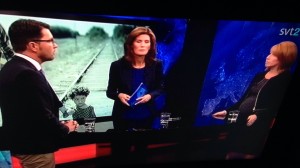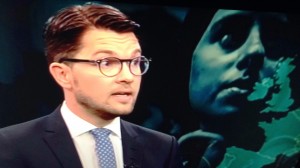By Jonathan M. Feldman
September 2, 2015
 Problem I: Free Advertising for a Political Party Formed by Nazis
Problem I: Free Advertising for a Political Party Formed by Nazis
Periodically, Swedish Television (SVT) invites leaders of the Swedish Democrats (SD) to debate others from the left or the right about the merits of having more refugees come to Sweden. Invariably, SD says that refugees and immigrants are very costly. The opponents, whether on the right or left, ignore SD’s arguments and talk past them. One reason may be that politicians don’t know how to use a library or do actual research to support their ideas. There is research on this question that is widely available. Another reason may be that they believe that they will lose this argument about economic costs. Or, they don’t want to win the argument by pointing to the need to raise taxes or change budget priorities or develop a radical new form of integration based on democratic cooperatives.
These debates amount to a kind of free advertising SVT provides for SD. One can argue that this hypothesis is correct because usually it is SD leaders who debate other parties. SD is not usually left out of this debate anymore. This is how Swedish television maintains its claim that it is “objective” and “balanced.” Of course, it is not balanced when it comes to coherent arguments. Yet, that is not so important anymore. It is really the logic of a sporting event in which everyone plays by the same rules. Yet, SD’s over-representation on the refugee and immigration question seems like a violation of fair play in sports as this “team” gets to play more games than the other teams. SVT probably does not agree with this interpretation because they decided that SD owns the refugee and integration question just like the Moderate Party owns the growth and entrepreneurship question. Why do they own it? Because they talk about it more than the other parties. They have what business theorists call a “first mover advantage.” The other parties don’t want to dilute the territories that they own because they have “first mover advantages” there.
Here we come to thought experiment one. Swedish Television might decide to give the territory of talking about the refugee crisis to other parties and not just pair SD up with rotating opponents. Then, some statistician can study whether this affects SD’s poll numbers. I personally believe that SD support is over-determined, influenced by many factors. Yet, one key problem is that SVT does not understand or appreciate that party opponents of SD are not very sophisticated or well informed in their opposition to SD. Rather than subject listeners to SD’s even more superficial ideas, they might have the common decency to rotate the superficiality among multiple parties. This brings us to problem number two.
 Problem II: Failure to Understand War, Migration and Sweden’s Role
Problem II: Failure to Understand War, Migration and Sweden’s Role
Jimmie Åkesson, SD’s leader, said in his debate with the Center Party leader Annie Lööf, that refugees come to Sweden to get access to the country’s welfare system. This is the “immigrant pull” argument. Yet, he and his opponent in this debate could have emphasized the “immigrant push” argument, i.e. a lot of immigration is based on fleeing from war zones and other tragedies.
This relationship between war and migration might be obvious to migration scholars, but they seem less interested in how war itself is a dependent variable. War is partially dependent on the weakness of plans and proposals to demilitarize. It is partially dependent on the political viability or relative power of the peace movement. It is dependent on the peace movement’s ability to form wide coalitions with civil rights, human rights, economic, labor and environmental constituencies.
Why is the academic community in a bubble? First, one potential reason is that to argue these points makes you appear to lack legitimacy or respectability, which for academics is considered a prime achievement.
Second, some academics are blinded by their own theories. They don’t see war as an economic question, or migration as a peace question but only a race question, or perhaps some other problem. Yet we know that migrants could be absorbed more easily if we converted some military resources to ethnic absorption and integration.
Third, many migration scholars and those brought into television discussions may have a left ideology and be totally cynical about the limits of what television broadcasters understand or are willing to listen to or broadcast. They, rather than just SVT, need to do their own action and thought experiments to see if this is really true. At the very least, such academics should join a media accountability organization that treated SVT coverage as a dependent variable, i.e. dependent on what the public accepts as in the public interest after being exposed to the organized counter ideas of a media accountability organization.
Finally, one also has to understand that many scholars in ethnicity and migration have fetishized their academic discipline so that it has little to say about questions of war, demilitarization and alternatives. Why? Well, for reasons similar to the turf or territory issues of the political parties, i.e. many academics studying migration believe that it is not their academic or intellectual territory. They, like the politicians, may lack the knowledge they need or lack an interest in gaining that knowledge. Like the politicians, they may gain representational power by sticking to their incumbent or path dependent niches.
Yet, there are some persons interested in migration questions who are not established academics who have gone further. They probably did not know what they were not supposed to know. What they were not supposed to know was that militarism promotes war and not just that war promotes refugees. They were not supposed to know that militarism takes diverse forms and that arms exports can promote conflicts. This relationship is known to various scholars on militarism, but ethnic and race scholars in contrast often seem totally indifferent to problems of militarism as this particular ism is not on their radar. Among contemporary academics, it is now a rather unfashionable ism for building academic capital, reputational capital or status among a whole group of academic leftists. Some reduce militarism to problems of capitalism or gender, neither reduction being totally satisfactory for explaining basic problems of demilitarization tied to: a) disarmament, b) conversion of defense firms, c) alternative civilian and infrastructure investments, or d) the creation of a media accountability organization sensitive to the problems specified in this essay.
Fortunately, Lina Eriksson in a Masters Thesis at the University of Waterloo, has written a very important essay called, “Western European Arms Export and Asylum Immigration: A Connection? On the Determinants of Asylum Immigration to Western Europe.” You can download this essay on line at this link. The point she makes relates to a rather taboo topic in Swedish politics. This topic is not simply that arms exports are bad, but that they could be contributing to the very conflicts that fuel war zones, militarists and hence the refugee crisis. This line of thought relates to another forgotten topic, i.e. how Swedish political and cultural elites rallied behind support for intervention against Libya in 2011. Some academics refer to Sweden’s humanitarian intervention against Libya, even though the changing of regimes in Libya has had totally dystopian results and is partially linked to parts of today’s refugee crisis as ISIS now has a foothold in Libya. Of course, some see military strikes against ISIS as a solution to the refugee crisis tied to ISIS’s expanded presence. Yet, bombing of ISIS areas could also promote more refugees.
In any event, our second thought experiment for Swedish Television is the following. Try to invite experts who can connect Sweden’s military actions (via support for military intervention or arms exports), to wars or the growth of war zones, and hence the refugee crisis. Try to get a debate going between scholars familiar with the problems of militarism and ethnic scholars who don’t want to talk about these upstream problems. Also, ask ethnic or migration scholars who are willing to talk about such problems questions and encourage them to do so. Investigate if the results of this experiment is to raise the quality of the discourse.
Conclusions
In Sweden, both the mainstream society and the loyal opposition have been unable to successfully constrain the growth of the local far right party. The growth of such parties partially depends on how they negotiate the media field of power and extend their representational power and media capital. A logical and coherent Left would try to challenge this connection with specific ideas and action programs rather than simply deconstruct the phenomena of media bias as something fitting into their favorite ism.
The far right gains by linking media presence to face-to-face organizing and “connecting the dots,” connecting issues, albeit in a superficial and dystopian fashion. A practical utopia, as Paul Goodman argued long ago, depends on various thought and action experiments. This conception of an alternative democracy was shared by John Dewey and others who support the active social, economic and political reconstruction of society.
Postcript
Two days after this essay was published, an anti-war group based in London published an essay about the links between colonialism and refugees. The article did not highlight the role of arms exports, however. A week later the U.S.-based radio program Democracy Now featured Annette Groth, a member of the German parliament, who linked the refugee crisis to U.S. government initiated wars.